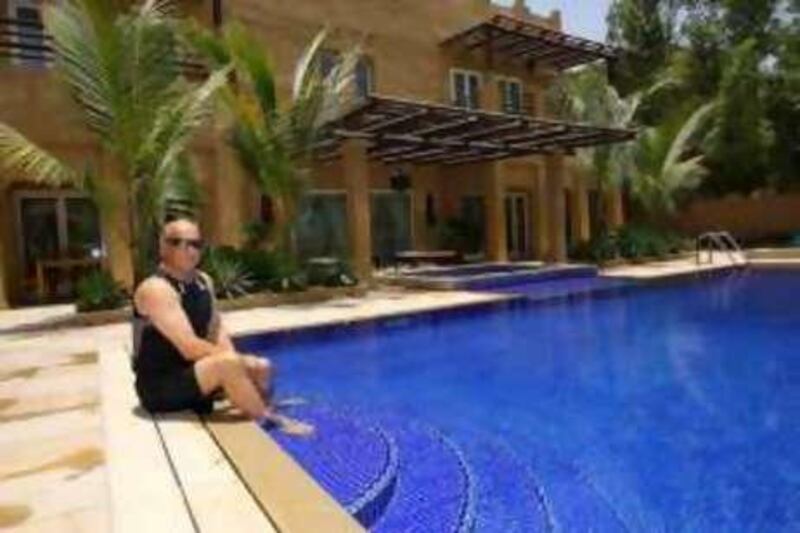When Rod Smith arrived in the UAE 20 years ago, a home with a chlorinated swimming pool came as standard. "We used it a lot, especially in the evenings and on weekends," said Smith, 56, a father of four originally from Bradford, England. "It was a real pain because when they were little, my kids had to wear goggles to stop their eyes from stinging, and when we had people round, they had to wear goggles, too. It didn't leave much room for fun."
Four years ago, Smith, who runs his own oil drilling company, Smith Drilling Systems, heard about a new chlorine-free system and had it installed at his home in Emirates Lakes. He hasn't looked back. "It's great," Smith said. "The people come around and check it every so often, but there haven't been any problems. This system is completely neutral, so it's just like swimming in fresh water. We were fed up with messing with chlorine."
The Dubai-based Belhasa Projects, the largest swimming pool company in the country, installed a system called E-Clear, which has been used in South Africa for the past 12 years and for seven years in the Middle East. The system works through a process of ionisation, in which water is pumped through a chamber lined with copper and silver electrodes, which disinfects the water before it is returned to the pool. The system costs some 15 per cent more than ones using conventional chlorine, but Charles Almeida, a spokesman for the company, said clients recoup the added outlay by not having to purchase chlorine, and through lower operating costs.
Chlorine, used as a disinfectant, is a chemical compound manufactured from the element chloride through a variety of processes. Some frequent bathers have complained of sore eyes, itching skin, discoloured hair and respiratory problems, but Nigel Finzi, the director of Belhasa Projects, puts it even more strongly. "Most people only use it because it's cheap but there are huge problems with it." The company has installed almost 200 E-Clear systems in the UAE. One of Finzi's biggest projects to date is the 5,000-square-metre, 10,000-gallon freshwater lake on Lulu Island, which has been used by thousands of families in Abu Dhabi since it was completed three years ago.
The Emirates is also seeing an increase in salt-based swimming pool systems, which use less chlorine than conventional methods and eradicate the handling of chlorine at pool sites. Saltwater chlorination is a process of sanitising water using a form of chlorine that is produced in the pool water from ordinary salt. Saltwater chlorinators convert salt into liquid chlorine through a process of electrolysis developed in Australia more than 30 years ago. The system is used in over 90 per cent of residential pools in Australia.
Initially, a certain amount of salt is added to the water. As water passes over the chlorinator's specially coated plates, an electric current breaks down the salt and water into their basic elements to form sodium hypochlorite, the active sanitiser in all forms of chlorine. The chlorine kills algae and bacteria in the water and oxidises the waste; thereafter, the chlorine turns back into salt, which has a softening effect on the water. Both ionisation and saltwater chlorination systems destroy the strong chlorine smell found in conventional pools.
Aquaclear is a saltwater chlorination system that has been installed in dozens of hotels and thousands of homes in the UAE in the past four years. The company says Aquaclear is safer than ordinary chlorine systems because it delivers the right amount of chlorine in pools, reducing the incidence of sore eyes and bleached hair. It is also more environmentally friendly because it reuses salt, producing less chlorine and allowing for the use of seawater. "On-site chlorine generation requires far less energy compared to commercial chlorine plants," said a spokesman. "Reduced handling of chlorine also means less environmental damage due to accidental spillages."
Hotel chains using the Aquaclear system include Shangri-La, Hyatt, the Jumeirah Group and Radisson SAS. Christian Tjenderasa, the assistant chief engineer of the Shangri-La Hotel in Abu Dhabi, said the hotel had been using Aquaclear in its three outdoor pools for the past year. "Now we have no headache about handling chlorine - we just buy table salt," he said. "We have never had any complaints about red eyes, hard hair or green hair because this system produces a different form of chlorine to the conventional compound. People are happy to bring their children here. To have no crying kids is one less headache. More and more people are asking us about the system we have in place before coming here, and when guests experience it they say they want to have it at home. It's also safe for my staff." Tjenderasa said the hotel would consider switching to a completely chlorine-free system if it was proved to be suitable for large, luxury swimming pools.
Nicholas Fernandez, the assistant chief engineer at the Radisson SAS Dubai Media City, said both the hotel's swimming pools used the Aquaclear system and that it was a "great, eco-friendly product". "Guests contact us to ask what our chlorine levels are. They really know what they are talking about and are very concerned about it. Our chlorine level is very precise and it is monitored online so the company can make changes. So far we have not had any problems. In previous hotels I've worked in there were very adverse effects, particularly when women with dyed hair jumped in. There was a chemical reaction with the hair. This is a different sort of chlorine which is completely safe."
@Email:rbehan@thenational.ae





